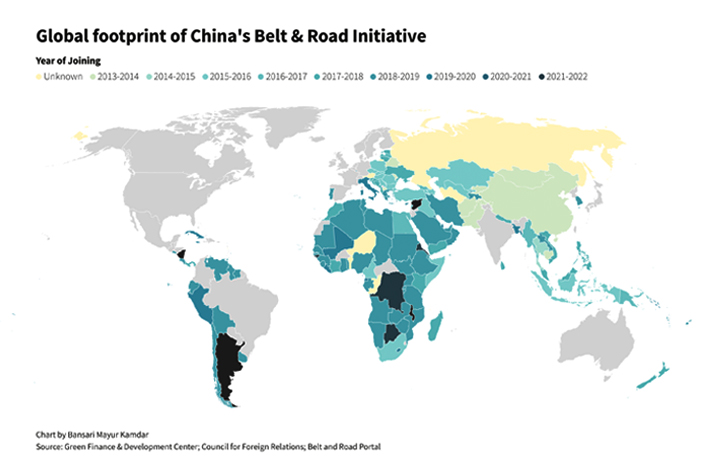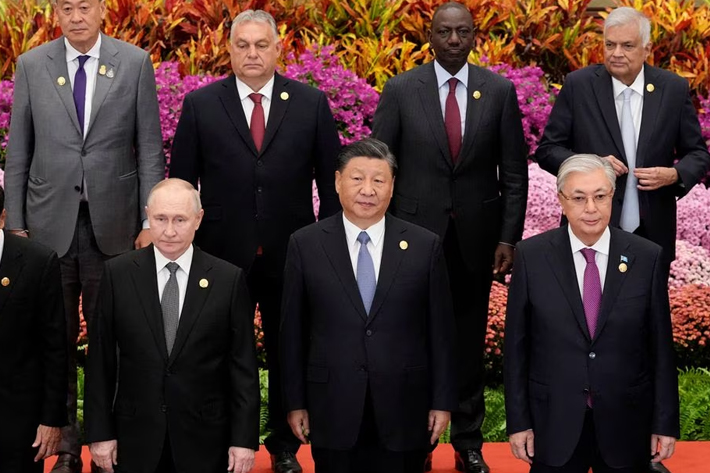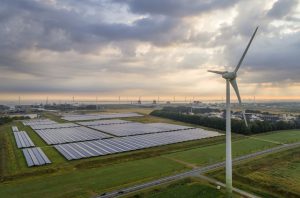Chinese President Xi Jinping on Wednesday pitched his signature Belt and Road project for greater global cooperation on green development and artificial intelligence, signalling a shift from an earlier focus on big-ticket investments.
Speaking as he opened the Belt and Road Initiative (BRI) forum in Beijing, Xi pledged to “deepen cooperation in green infrastructure, energy and transportation”, and “put forward global initiative for artificial intelligence governance.”
Analysts say BRI’s shift from investment intensive projects like dams to high-tech ones such as digital finance and e-commerce platforms comes as Xi seeks to use the project to export Chinese ideas about governance.
Also on AF: China’s GDP Growth Rose in Third Quarter, Latest Data Shows
Push for a multi-polar world order
Xi is also looking to build consensus around Chinese norms and its development model, analysts say.
The aim is to aid a broader push for a world order that is multi-polar and gives the Global South more agency, rather than one dominated by Washington and its allies, analysts say.
The shift also comes at a time when Beijing is dealing with soaring costs of the infrastructure scheme, all while dealing with a mounting debt crisis in local governments and the property sector at home.
A study released in March found Beijing spent $240 billion to bail out 22 developing countries that were struggling to repay BRI-related loans.
The Covid-19 pandemic and the inflation spike that followed worsened that crisis, as various emerging economies became strapped for cash. Around 60% of China’s BRI loans were owed by nations in debt crises as of September last year, Nikkei Asia reported.
Warning against decoupling
After Xi’s speech, China’s foreign ministry said the country would push to create a United Nations body to regulate artificial intelligence.
The ministry added that Beijing opposes “malicious obstructing” of other countries’ AI development, likely a reference to the Biden administration’s efforts to block export of advanced AI chips to China.
The US released an array of new rules on Tuesday, which included halting shipments of more advanced artificial intelligence chips designed by Nvidia and other companies from next month.
On the heels of the release of those rules, Xi also warned the West against decoupling from China.
“We stand against unilateral sanctions, economic coercion, decoupling and supply chain disruption,” Xi told more than 1,000 delegates gathered in an ornate conference room in the Great Hall of the People west of Tiananmen Square.

“Our lives will not be better and our development will not be faster if we view the development of others as a threat and economic interdependence as a risk,” he added.
Western leaders insist, meanwhile, that their goal is to “de-risk”, not “decouple”, from China.
China’s threats to Taiwan and supply-chain disruptions caused Beijing’s stringent pandemic-related shutdowns have fuelled Western efforts to diversify supply chains that have become overly dependent on the world’s second-largest economy.
Western scepticism of BRI
Western scepticism of Xi’s grand plans stems from suspicions over the way it would extend China’s global influence, analysts say. China has at times bristled at criticism of the BRI, saying it carries anti-Chinese prejudice and a wish to contain its rise, while overlooking what it says are genuine good intentions.
Last month, Italy — the first major Western country to join BRI, despite US protests — said the “atrocious” move to become part of the project did nothing for the European country and only helped China.
Rome is seen as highly unlikely to renew its participation in the BRI. The deal expires in March 2024.
Analysts have also said some of China’s infrastructure lending through the project has saddled poor countries with loans they can’t repay.
Indonesian President Joko Widodo, whose country owes China more than $20 billion, emphasised in a speech that BRI projects “must not complicate (countries’) fiscal conditions”.
A European business representative, who did not want to be named for sensitivity reasons, said on the sidelines of the ceremony that BRI was, “creating impact for some of the countries involved” and that, “I think there is some truth to some of the speeches about improving livelihood and connectivity.”

EU diplomats missing, Putin in attendance
Although BRI first set out to connect China to Western Europe, senior EU figures were missing from the forum. The sole head of state present from the bloc was Hungary’s populist Prime Minister Viktor Orban.
Representatives of more than 130 countries, largely from the Global South, were in attendance including several heads of state. Of them, the most prominent was Russian President Vladimir Putin.
Putin and other foreign leaders sat with key Chinese officials from the 25-member Politburo on the front row, as Xi delivered his opening remarks.
In an address that followed Xi’s, Putin called the Chinese president his “dear friend” and heaped praise on BRI for bringing the world together. Russia could play a key role in China’s modern day revival of the ancient Silk Road, he said.
Putin also invited global investment in the Northern Sea route which he said could deepen trade between east and west.
“Russia does not just offer its partners to actively use [the Northern Sea route’s] transit potential… we invite interested states to participate directly in its development, and we are ready to provide reliable ice breaker navigation, communication and supply,” Putin said.
“Starting next year, navigation for ice-class cargo ships along the entire length of the Northern Sea Route will become year-round.”
Other notable attendees at the forum included the Afghan Taliban administration’s commerce minister Haji Nooruddin Azizi.
“China has more interest right now in developing Afghanistan at this moment, so we are more engaged with China. The Chinese have more interest in economic affairs, that’s why we’re here,” Azizi told a gaggle of reporters at the ceremony.
- Reuters, with additional editing by Vishakha Saxena
Also read:
Israel-Hamas War Casts Long Shadow Over China’s BRI Stocks
China Denies Belt And Road Forum Being Shunned by The West
‘Atrocious’ Move to Join China BRI Didn’t Help Italy: Minister
China’s Belt & Road Project ‘Facing Mounting Opposition and Debts’
China’s Belt & Road Cut Funds for Foreign Coal Plants: Report
G7 Unveils $600bn Fund to Take on China’s Belt and Road
























